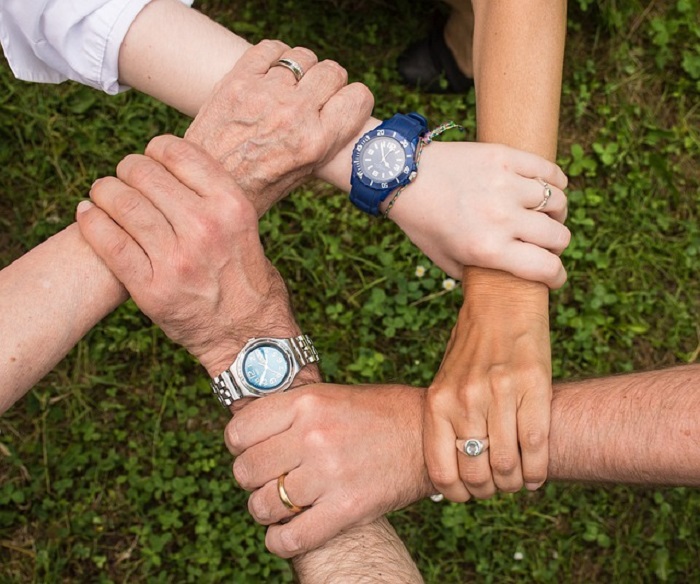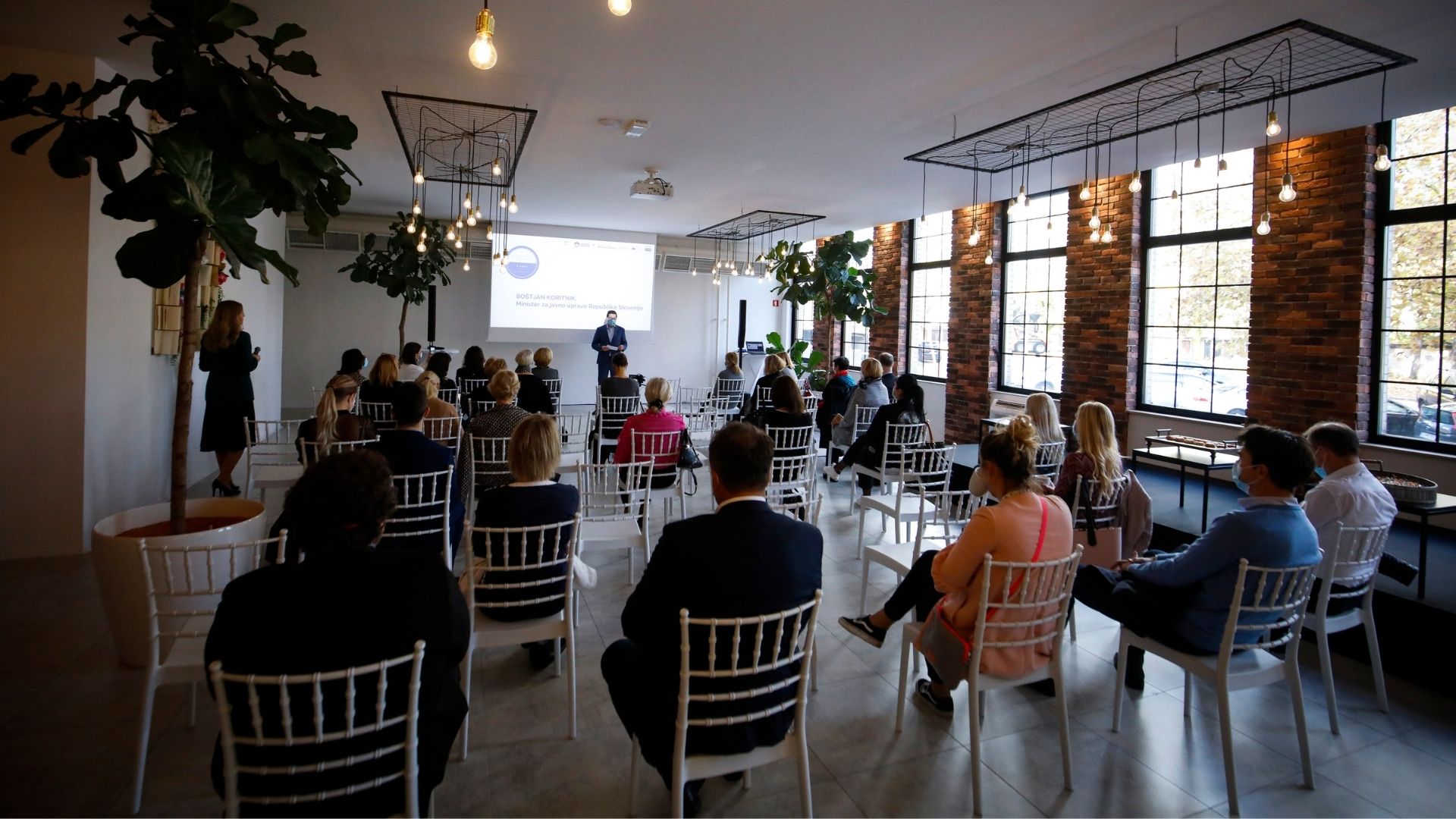The idea for the Partnership for Change emerged during a relaxed conversation, when some young people from the Snowball group had “pizza and beer” with the Minister for Public Administration Boris Koprivnikar. In searching for ways to better connect businesses and government, the idea of exchanging employees in business and the Ministry of Public Administration came up. In June 2015 the pilot project Partnership for Change was begun and 27 employees from 23 companies and the Ministry of Public Administration made the first exchange. Participants succeeded in breaking down some stereotypes already in the first round, above all the one about the “lazy civil servant”.

Round 2 – looking for solutions together
After the successful first exchange of employees, in autumn 2015 the project, which was led by the main coordinators AmCham Slovenija and the Ministry of Public Administration, was joined by other ministries and over 30 Slovenian and international companies. Project participants together selected five challenges for which employees at participating businesses and ministries sought solutions over the course of the year. The second round of employee exchanges, involving 67 employees, 30 companies, and 5 ministries, took place in June 2016. After the successfully completed exchanges, five groups presented five solutions to the five challenges at the final event and set themselves the further challenge of implementing them in the next round of the Partnership for Change.

Round 3 – implementation
In round 3 of the Partnership for Change, the group of participants grew again and numbered 75 employees, 36, companies and 6 ministries. The Partners for Change found and practically implemented solutions for the greater motivation of government employees, strengthened interministerial cooperation, drew up draft teaching curricula for the 21st century, formed user-friendly online services, and increased the visibility of the I Feel Slovenia trademark in business. The participants presented the implementation of all five solutions in practice at the closing event for round 3, and before that the third exchange of employees between business and the civil service had taken place, which again showed that through cooperation and association new successes can be achieved.
The Partnership for Change program also received foreign awards. In 2016 the program received the Creative Network Award for best practice from the AmChams in Europe network, which connects 44 countries and 46 AmChams in Europe and Asia. In July 2016 we also participated in the OECD call for applications for innovations in the public sector, which is looking for interesting stories on the global level. Among over 150 applications, we reached the shortlist and presented our program at one of the largest annual government conferences in Dubai. Many countries expressed interest in the program and hope to implement it.

Round 4 – solving challenges together
In round 4 we opened the doors to all who recognize the importance of values such as bold responsibility, playful innovativeness, and working together in partnership, as we searched for solutions to problems recognized by various stakeholders in society and entered them in the competition. We received 31 applications and chose 3 challenges, which we solved by cooperation through the fourth round. How to identify and retain talents in the private sector, how to clear Slovenia of paper bills, and how to impress 300,000 Slovenians with the ambition of “Slovenia, the green reference country in digital Europe” were the three challenges on which they worked throughout the round to create prototypes to solve the above challenges. This is how our wish was fulfilled and the Partnership for Change became the national innovative platform of cooperation that can take on any challenge. In round 4 we maintained the practice of employee exchanges between the public sector and companies, members of AmCham Slovenia. The participants included 14 civil service bodies with 39 employees, and 39 companies with 13 employees. Overall 52 employees took part in the exchange.

Round 5 – United for action
In Round 5 we continued looking for challenges that would improve the quality of life and the business environment in Slovenia, and received 13 applications. With the help of the Committee and a vote we chose three challenges, which we then proceeded to solve: ‘I’m a teacher! Examples of Good Practice of Primary School Teachers’, ‘Writing Out a Request for Granting Building Permits – Simple Task Anyone Could Do’, and ‘Improving the Capacity or Uptake of E-government Service’. The Round 5 exchanges saw the participation of 15 civil service bodies (8 ministries, 4 government services, 2 constituent bodies, 1 public agency and 3 administrative units) with 37 employees, and 32 companies with 21 employees. Overall, 58 employees took part in the exchange.

Round 6 – United for action
As the Partnership for Change is above all about cooperation and breaking down barriers between government, businesses, and other stakeholders in society, we continued with the challenges in round 6. For the first time we received four challenges, including ‘Young people on their own – setting up a platform for cooperation on housing issues’, entered by PiNA – the Association for Culture and Education; ‘My piece of Slovenia – introducing institutional allotment gardening’, entered by Mladinski kulturni center Maribor; ‘Buying a voucher for personal supplementary work – the user should choose’, entered by Administrative Unit Mozirje; and the ‘Mobile application e-Taxes’, by the Financial Administration of Slovenia.
All four challenges solved their tasks in one way or another and reached the solution. Round 6 of the Partnership for Change was also marked by the coronavirus pandemic, which had a considerable effect on practical operations and unfortunately also prevented the employee exchange from taking place. However, the conclusion of Round 6 of the Partnership for Change was part of the global event organized by the OECD entitled “Government After Shock”.

Round 7 - Small victories on the way to ultimate success
In the 7th round of the program, we were solving three significant challenges. The Knowledge Transfer Office of the University of Ljubljana (with challenge ADDED VALUE/ADDED KNOWLEDGE! Compliance Between University Knowledge and the Labor Market), the National Institute of Chemistry (with challenge NICKI: Proof of Concept Incentive), and the Institute of Oncology Ljubljana (with challenge Proton Therapy in Slovenia—a Responsible Contribution to Society and the Public Healthcare System) have proven that with enough willpower, determination, and willingness to cooperate, important small victories can be achieved on the way to ultimate success.

Round 8 - Let's Cooperate!
Every year we further solve challenges considered crucial by various societal stakeholders. Ledina Kindergarten (Challenge: Zone: Ledina Kindergarten), AmCham Ready 4D Future Committee (Challenge: There Is No Green and Digital Society Without ICT Professionals), and Municipality of Kočevje (Challenge: How to Bring Local Businesses Closer to the Youth) were good examples of strategically solving challenges. Their success resulted from understanding the reasons that drive change and thus achieved progress with their joint efforts.

Rounding Off with Round 9
In the round 9 three projects have proven that with enough willpower, determination, and willingness to cooperate, important small victories can be achieved on the way to ultimate success.
AmCham Future of Work and Education Committee: Boosting the country’s competitiveness by facilitating the employment of foreign experts
Being aware of the need for highly educated staff in Slovenia, in 2023 the working group within the Future of Work and Education Committee endeavored to shorten the procedures for recruiting foreign citizens. Namely, in Slovenia, a highly qualified workforce is in short supply, as due to more favorable tax and other policies such workers seek residence and employment elsewhere, which has an adverse impact on the domestic economy.
The world has been evolving into a global village, with work processes becoming more flexible. We have been witnessing workers moving to foreign countries as well as digital nomads, who normally do not settle in one location for a stretch of time. It is precisely for this reason that Snowball, a think tank of young people, has prepared a three-year program to attract such profiles to the country.
The University of Ljubljana, Faculty of Computer and Information Science: The introduction of a compulsory course – Computer and Information Science in primary and secondary schools – so that we will design our future
Digital skills, competences, digital literacy, and knowledge of digital technology are the fundamental skills of the 21st century that we need to be active creators, not just followers. Individuals and society will be successful if we not only use digital technology, but also understand and master it. In 2023, a major portion of the Future of Work and Education Committee’s activities focused on introducing computer and information science in primary and secondary schools as a mandatory subject.
The Ministry of Infrastructure and the Sustainable Mobility and Transport Policy Directorate: Sustainable commuting
The green transition is increasingly talked about in the corporate sector; however, we can launch good practices ourselves. The Ministry of the Environment, Climate and Energy thus organized the Bike to Work campaign, and such practice is rewarded with incentives to make a bicycle the preferred option over the car when choosing a means of transport.
Work process flexibilization brings flexible working hours. The said Ministry introduced a flexible hours schedule on a test basis, allowing flexible working hours. The initiative met with an extremely positive response.
